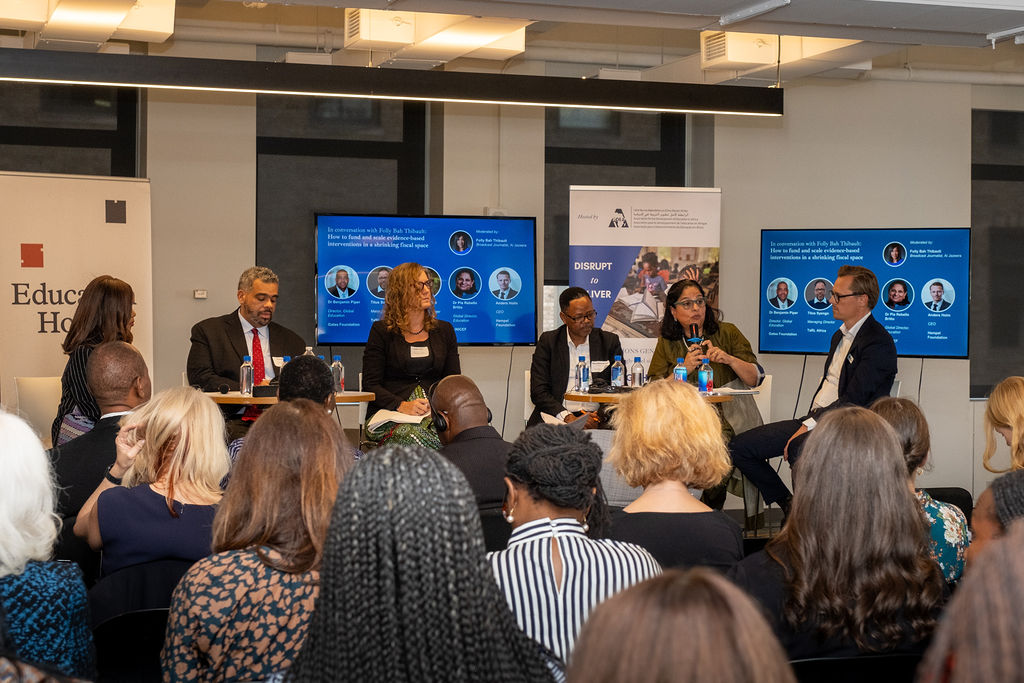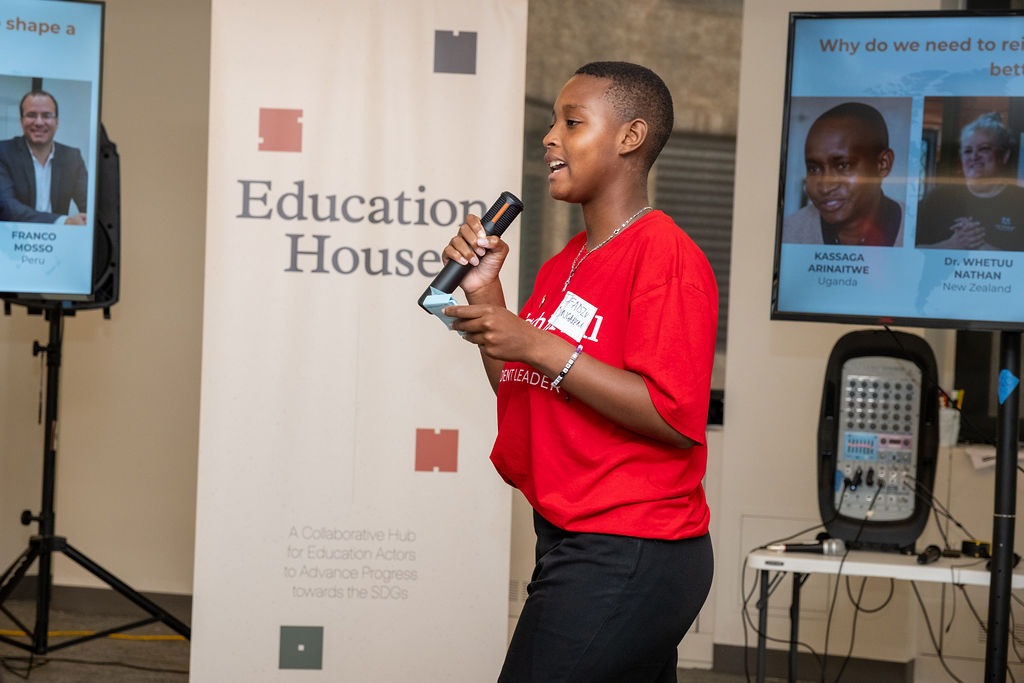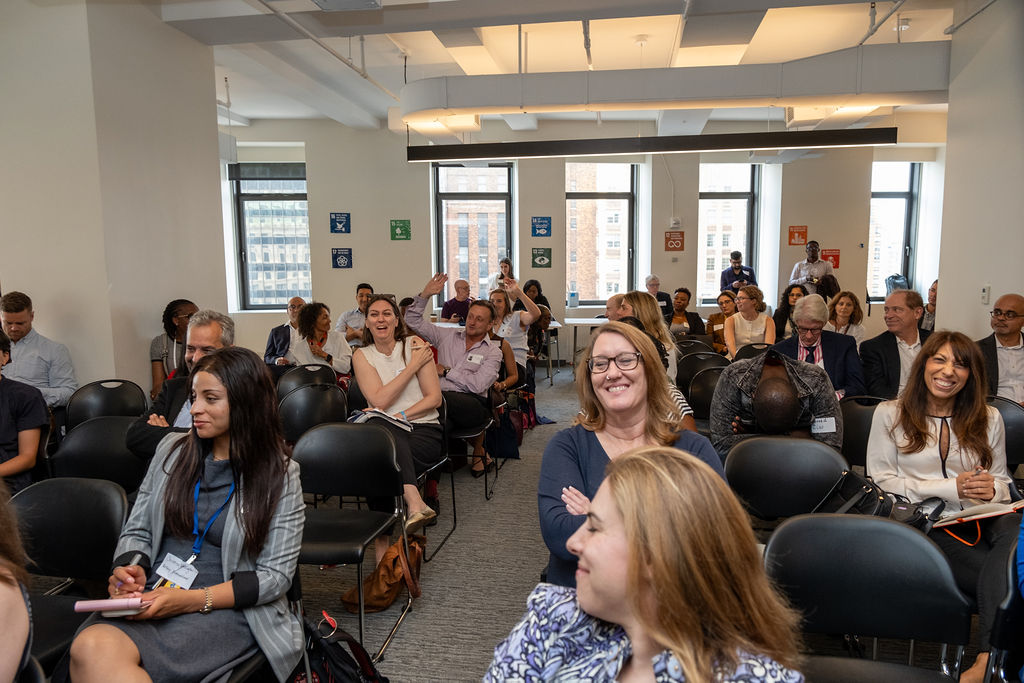Agency, Access & Action: Youth Flourishing in Complex Times
Hosted by the International Baccalaureate (IB)
Preparing students to shape a better future requires action across the whole ecosystem of education and beyond the classroom. Systems must enable authentic youth agency and provide the resources to make it real. A key theme was the tension between demand for quick, measurable results and the reality that lasting outcomes—like flourishing, leadership, and community change—emerge over years, often through relationships and growth that defy traditional metrics. The session highlighted a persistent gap: young people too often remain in advisory or symbolic roles, while adults, even with good intent, block progress by holding control too tightly. A critical enabler is funding—without sustained resourcing, youth initiatives risk remaining aspirational. Drawing on IB’s own work and the diverse perspectives shared, participants emphasized the need for structures where youth hold real decision-making power, have access to resources, and are valued not only for outputs but for how they help communities flourish.
Explore more: https://ibo.org/festival-of-hope/media/agency-access--action-youth-flourishing-in-complex-times?contentId=205304
Beyond Big Aid: Forging new pathways for impact and scale in education
Hosted by Generation, Global School Leaders, STIR Education, and TeachUNITED
The session explored shifting from competition to genuine collaboration, recognising what each actor does best and working in the service of others. Participants also discussed rethinking financing, looking at philanthropy, domestic resources, and private capital, while avoiding the distraction of “innovative finance” for its own sake and urged careful consideration of AI, noting its potential to widen inequalities if not grounded in local realities. The need to ensure scale is sustainable and equitable, not just lowest cost or easiest to measure. The session landed on how to move from “egosystems” to ecosystems. This means moving from replication to amplification: embedding proven approaches into existing systems rather than endlessly starting new pilots, and building coalitions rooted in local contexts instead of individual logos. The Q&A underlined the importance of local ownership, ensuring funding and solutions are shaped by those on the ground, and not leaving behind contexts where access to electricity and connectivity remain major barriers.
Explore more: https://www.globalpartnership.org/blog/amplification-way-interventions-can-maximize-impact-education
Breakfast with the Changemakers: Building Better Foundations for Every Child
Hosted by: TaRL Africa, Pratham, VVOB, and Youth Impact
A discussion on embedding proven foundational learning approaches into education systems and how long-term collaboration is already transforming learning outcomes for children across Africa. This session concluded that for students to gain the skills to shape the future, we must move beyond implementing strong classroom practices and focus on building education systems designed to sustain them. The conversation surfaced that while there is growing government ownership of foundational learning and strong evidence for approaches like Teaching at the Right Level, a critical gap persists. Too often, the “middle” of the system—the district officials, school leaders, and teacher support structures—lacks the resources, skills, and stability to translate national vision into daily classroom reality. Participants agreed that the path forward requires a unified effort from the wider community to provide long-term financing, foster deeper collaboration, and deliver localized materials and coaching that build lasting capacity within ministries. Sustainability is not the result of a single breakthrough program. Rather, it is achieved by getting the right mix of ingredients into the system—from motivated teachers to aligned curricula and supported school leaders—and ensuring they stay there. The session’s ultimate call to action for funders, policymakers, and educators was to invest not just in what works, but in the enduring ability of governments, teachers, and communities to carry it forward.
Explore more:
www.tarlafrica.org
Co-Creating Capacity: Aligning Community and Government for Scalable Foundational Learning
Hosted by Building Tomorrow
This panel and workshop aimed at exploring effective principles for embedding community volunteers within government systems in ways that strengthen foundational learning, support national education goals, and build resilient, locally driven ecosystems of learning support. Among participants was broad agreement that community education volunteers are a critical part of the solution to the global learning crisis. For volunteers to be fully integrated into government systems, there must be a clear value proposition for the volunteers themselves, trust among all actors, and appropriate safeguards.
Explore more: https://www.buildingtomorrow.org/cevs/
Education Post-2030: What Roles for Educators?
Hosted by KnowledgeWorks, Learning Planet Institute, NCEE, Rethinking Assessment, and Salzburg Global
The discussion centered on a critical question: "Is the goal access to effective educators or access to high-quality education?" The session explored how technology like AI could prompt a rethinking of the educator’s role, potentially handling content delivery to free human educators to focus on skills central to human development—such as flourishing, happiness, conflict resolution, and courage. As a provocative reality check, the group acknowledged that in a time of global crises, having AI teachers may be better than having no teachers at all. However, the session's key conclusion was that before we default down that path, we must first catalyze more intentional conversations in our local contexts to proactively define the uniquely human purpose of learning. Here is a short video of the session.
Explore more: https://www.salzburgglobal.org/news/latest-news/article/global-insights-on-educator-roles-for-new-approaches-to-learning
Launch of Learning Planet Youth Design Challenge 2025-26
Hosted by Learning Planet Institute, UNESCO, and United Nations University
In this session, young leaders took the center stage. Past Youth Design Challenge participants shared how they created and delivered their impactful projects. Attendees explored together how to best design the future of learning with youth. A clear takeaway was the need to place youth and intergenerational collaboration at the forefront. The session modeled this principle directly as key partners, including Teach For All and World Scouts, were led by their youth members, reinforcing a simple, powerful message: representation counts.Explore more: https://www.learningplanetinstitute.org/en/ydc/
No Longer at the Margins: When the Global Majority Leads
Hosted by: Dream a Dream
This session challenged participants to confront and shift entrenched power structures in education. The core reflection was that truly equipping young people requires moving beyond technical training and narrow metrics to cultivate deeper capacities like discernment, trust, compassion, and shared responsibility. A powerful consideration surfaced: justice without love risks deepening polarization. The discussion concluded that preparing students for the future requires not only shifts in power but also cultivating the skills of connection and stillness. The ultimate call to action for policymakers, funders, and educators was to stop designing on behalf of young people and the global majority. Instead, create intentional spaces for them and their communities to lead with trust and shared responsibility, fostering an education system rooted in belonging and justice.
From the Margins to the Center: Transforming Education Systems Where it Matters Most
Hosted by: World Vision International
Making equity strategic requires courage in both financing and accountability. The session concluded that countries must look beyond top-line education budgets to ensure funds are directed toward those most in need. Data systems are a critical lever: without disaggregated information on gender, disability, or refugee status, policymakers cannot track who is being excluded or hold systems accountable for results. Participants identified practical pathways to embed equity, including financing models that reward inclusion, flexible learning options that combine formal, accelerated, and digital approaches, and sustained investment in teacher retraining and delivery capacity.
The Hope Collective: A Space for Reflection, Creation, and Connection
Hosted by the International Baccalaureate (IB), Ready Generations, Salzburg Global, and the Shirley Chisholm Cultural Institute
The Hope Collective is an informal alliance of organizations advancing reflection, collaboration, and creative exploration around hope’s role in society and education. This session created a space to facilitate and witness moments of introspection. It reminded participants that building connective tissue also requires connection among the people doing the work.
Explore more: https://www.linkedin.com/pulse/spaces-hope-barbara-bullard-ru8xe
What Distinguishes Transformational Classrooms Around the World?
Hosted by: Teach For All
An exploration of "Teaching as Collective Leadership (TACL)," a model of transformational teaching and learning that empowers students and communities. TACL is based on Teach For All’s engagement with over 4,500 leaders in diverse classrooms and systems, asking one fundamental question - what distinguishes transformational classrooms around the world? This session shared how Teach For All shifted focus from asking how teachers were supporting dramatic academic improvement, towards asking what is happening in classrooms where students are growing holistically as leaders shaping a better future for themselves and all of us. The session posited that while it is challenging to synthesise global patterns for locally-rooted contexts, there are lenses - students as leaders, teachers as learners, community as power and this work as systemic - that allow a set of contextualised strategies and outcomes that grow students as leaders of a better future.
What will it take to equip students to shape a better future?
Hosted by: The Education House Team
Hosted in a ‘Long Table’ format designed to equalize all voices, this session explored what it will take to prepare students for the future by expanding our very definition of what is foundational. The conversation affirmed that while literacy and numeracy are essential, they are insufficient. Social and emotional skills like agency and awareness are just as foundational for understanding the world, building relationships, fostering wellbeing and connectedness, and making change. The group reframed FLN to mean "Foundational Love of Nature" (an idea credited to Becca Katz of Good Natured Learning), arguing that a connection to the planet is critical, for there won't be a world left to love otherwise. A central theme was the role of adults in either enabling or constraining student potential. While teachers are the "ultimate force multiplier"—acting as leaders, activists, and mental supporters—all adults must cultivate a deeper trust in young people, giving them the agency and autonomy to make their own decisions, even if it involves making mistakes. This can be fostered by bringing students into collaborative communities, like the Wikipedia model, where they learn to share knowledge for the greater good. This shift in trust requires reorienting the curriculum to address challenges such as misinformation, redesigning assessments to measure what we truly value, and revaluing the teaching profession itself. The discussion also surfaced the non-negotiable importance of meeting basic needs, noting that hungry children cannot learn, making school meals a key priority in many contexts.
Knowledge Exchange Breakfast
Hosted by: Knowledge Exchange
An annual time to come together, share what we are doing, and reflect on our shared learning agenda over the last year on purpose, leadership, and accelerating systems change.
Powering Education Systems Through School Leadership: The missing link between Policy and Practice
Hosted by: Global School Leaders, Varkey Foundation, UNESCO Teachers Task Force
An interactive session highlighting the experiences of school leaders from the Global South and examining their crucial role as the missing link between policy and practice in education reform.
One Billion Futures Workshop: Weaving a Global Movement for Education
Hosted by: ShikshaLokam, Mantra4Change, Teach for All, Government Outcomes Lab - Oxford Blavatnik School of Government
A workshop exploring solutions to the crisis of education inequity in the Global South to prevent deepening inequality and global instability.
How do we involve parents and communities in supporting child learning from the early years to secondary education?
Hosted by: Building Tomorrow, Global Schools Forum, Lively Minds, PEAS
Children living in rural communities in lower-income settings spend a significant amount of time at home, yet parents and communities can still be overlooked as playing an essential role in supporting their child’s education. This session shared the hosting organisations' approaches to working with parents and communities to strengthen support for children’s learning at home.
Disrupt to Deliver: Financing the Future of Foundational Learning
Hosted by: Association for the Development of Education in Africa (ADEA), Gates Foundation, VVOB, TaRL Africa, UNICEF, Hempel Foundation, and Human Capital Africa (HCA)
School leaders are frontline architects of education reform. Yet their voices are too often absent from global education dialogues. Through focused discussion on the role of school leadership in advancing foundational literacy and numeracy (FLN) strategies, building gender-equitable schools, and technology in education, panelists shared what has worked—and what hasn’t—when translating policy into practice.
Learning for All: Global Recommendations for Inclusive Education by 2030
Hosted by: Aga Khan Foundation, Africa Dyslexia, CAST, Digital Promise, FANA-Ethiopia, Global Schools Forum, Luminos Fund, Teach for All, and Trevor Noah Foundation
While the spirit of inclusion for students with learning differences and disabilities is embedded in frameworks like the SDGs, realizing this vision demands a collective shift in how education systems are designed and supported.
Locally-led Systems Change with Governments in Education: Perspectives from Kenya, Afghanistan and Tanzania
Hosted by: Zizi Afrique Foundation, Global Schools Forum, Lighthouse Coalition, Teach for Afghanistan, Usawa Agenda, and the Bill & Melinda Gates Foundation
In recent years, decolonization and localization have become buzzwords. While evidence is still emerging, many in development understand their aims. With USAID’s closure and shifting aid realities, the picture grows more complex. Yet Global South voices—especially from Africa—remain underrepresented. This session offered an interactive space to expose on-the-ground realities and explore paths forward for localization.





